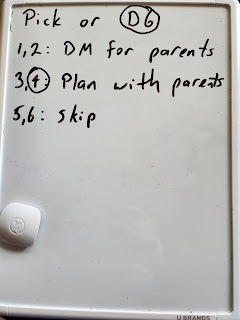Supporting Decision Paralysis
My kid has decision paralysis1. This became apparent around fifth grade with assignments that started like "Pick a country to do a project on!" and my kid would spend a day and a half analyzing and second-guessing and being unable to move on to step two.
Digression: Part of the challenge to parenting a 2e kid is not knowing how long a school sub-task is supposed to take. Asking teachers was surprisingly unhelpful. I assume teachers are trying to be inclusive when they reply "Some kids take longer and that's okay!" or "She can come ask me if she needs ideas!"
When I'm on top of my game I can figure out that if a 15-step assignment is due in a week students are supposed to do three steps a day. But I was rarely on top of my assignment-analyzing game while my kid is panicking, I'm trying to get school to answer emails about how accommodations are implemented so I can do them the same way at home for homework, and I've just found out my kid needs an animal print shirt tomorrow.
Partly my kid intrinsically has a trait that makes decisions harder. Partly I blame the parenting and teaching trend of telling kids "to make good choices". It's good that encouraging kids to think ahead replaced the trend of only giving punishments after bad behavior. But grownups' habits of talking to kids about choices all the darn2 time makes some kids feel that they are solely responsible for every possible consequence of their choice.
Our teenager has been GMing (running as Game Master) a D&D (Dungeons and Dragons) homebrew (the story is invented by the GM using standard game mechanics) campaign for my husband and me. This is fantastic! This lines up with several of my homeschooling goals! They started off improvising and ran some brilliant storylines. But sessions where new ideas don't spontaneously occur have been increasingly stressful.
So my husband and I started encouraging our teen to plan ahead. But the expectation to plan without the ability triggered panic attacks. This is the sort of situation where traditional authoritarian parenting and teaching increases the motivation ("Learning to plan is important!" "You'll feel more relaxed after you make a plan!") which is counterproductive because it increases the kid's stress and stress makes it harder to start the mental task. A lot of people's first instinct is to give ideas to help but that actually increases the decision landscape and makes picking one thing to work on harder.
This left me ruminating for weeks on how to support the process of decision-making.
Digression: The process of making decisions is something that a lot of students pick up in elementary and middle school but schools don't seem to explicitly teach it. Our school district has a good reputation in both gifted and SpEd so I was surprised they didn't already have a method or curriculum when I brought up decision paralysis with the IEP team.
My husband (by far the most experienced D&D player and GM in our family) started offering the option to have a planning session or skip altogether and that helped a good chunk.
Anyway after a couple weeks of trying but failing to think directly about my task and worrying about it, inspiration struck! (As I type this I realize this is a direct parallel to how my kid approached GMing.)
First I set up a white board to provide three types of support:
- I find it easier to analyze things I can see than things I've heard; like I can add two two-digit numbers in my head while looking at them written on a piece of paper but I cannot add them after someone tells them to me.
- Verbal questions from grownups often stress my kid so I was hoping that reading the question would get them thinking about it before worrying about it.
- The option to roll a D6 (six-sided die) let my kid offload the responsibility for the consequences of the choice.
Then I announced we were going to do a corporate-style brainstorming session to come up with about a dozen elements that might be included in a D&D side quest. My husband helped explain that the first part was suggesting brief ideas without analyzing them because sometimes considering bad ideas leads to good ideas and that the analysis part would come after we had a list. I appreciated his help because I had not planned sufficiently to explain that myself (again with the parallels to my kid's approach to GMing). Having two other people matter-of-factly (and sometimes jokingly) contribute supported our kids' abilities to both think of and verbalize things. That resulted in this list:
So I'm going to call this decision support a parenting success. My planning, structuring, implementing, accepting help, injecting humor, and supporting three decision frameworks (list with dice, brainstorming, journalism questions) went better than I expected. But I know my kid and repeating that exact structure is not going to keep working.
Footnotes! Because who doesn't love an essay with footnotes!
1. I feel like neither "decision paralysis" nor "decision fatigue" is a precise description. But I had to pick something.
2. I just today realized I don't have a policy for swearing in my own blog.
3. Journalism questions of "Who", "What", "Where", "Why", "When", and "How".





Comments
Post a Comment